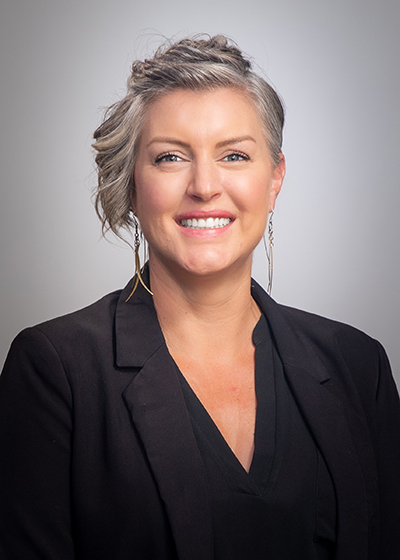Preparing for Disaster: UNM Hospital Participates in Region-Wide Emergency Training

Granting a Wish
UNM Clinic Closes a Health Care Gap for Trans Kids
As one of a handful of doctors providing gender-affirming care for young people in New Mexico, Molly McClain, MD, MPH, leads Deseo, a clinic for transgender people of all ages – especially children.
“For youth, the most important thing for their health is that their family loves them unconditionally and supports them, so it's really cool that my training involves contextual care – and not just an organ in a body,” McClain says. “It's the whole person, the whole family.”
McClain, assistant professor and residency program director in the Department of Family & Community Medicine at The University of New Mexico School of Medicine, is also leading efforts to educate medical residents so that they’ll know what to say and how to provide a safe space for trans kids.
She uses use her training to help educate families and patients at Deseo, based at the UNM Family Health Clinic in the Southeast Heights. They range in age from three years old to senior citizens.
“A lot of times the parents just want nothing but the best for their kid, but they're scared that they're doing the wrong thing by supporting the gender identity, which is the opposite of the truth,” McClain says.
Deseo, which means “wish” in Spanish, also serves as training ground for residents from the UNM School of Medicine. Generally, she trains a team that includes an obstetrics resident, a family medicine resident and a child psychiatry fellow.
“For younger kids, it's mostly, ‘Does this provider know how to say the right words? Does this provider create a space for physical examinations? Does this provider know when we should be thinking about starting medications?’” McClain explains. “That's the kind of stuff that you would want as a parent, for a younger kid who is gender expansive.”

What makes gender-expansive people sick has nothing to do with internal weakness or genetics or anything like that, and everything to do with exclusion – social and economic exclusion
During her residency, McClain realized that the transgender community wasn’t talked about very much, and a population health project led her to want to learn more about the disparities. She found that what “makes gender-expansive people sick has nothing to do with internal weakness or genetics or anything like that, and everything to do with exclusion – social and economic exclusion.”
Prior to her work at Deseo, McClain served as medical director for UNM’s Truman Health Services, where she kept hearing stories about a lack of services for transgender patients, particularly for children whose families often have many questions.
“There's all these kids with no doctor to go to, and there's nobody in town doing it,” she recalls thinking at the time. “I didn't really know that much about the barriers to health that so many trans folks and gender-expansive folks face.”
Though she didn’t have any experience in offering gender-specific care to children when she started the clinic, McClain was determined to learn how and to find a way. She received quick approval from Paul B. Roth, MD, MS, then-Chancellor for Health Sciences, and the Deseo clinic was born at the Southeast Heights clinic.
Deseo provides affirming space, she says. At around 10 years of age, families can discuss with their provider whether to have the child start a medication that suppresses puberty. Although it’s reversible, it has side effects that can affect bone health and fertility, she says.
“It basically just stops the production of testosterone and estrogen, so these changes that they might be saying are really upsetting for them can just be put on hold,” McClain says.
Deseo has a caseload of 400 to 500 patients, about 60% of whom are young people. McClain says about 25 children are taking the pubertal blockade. UNM Truman Health Services provides gender-expansive care for older youths, she says.
“Gender-expansive folks have had so much discrimination,” McClain says, citing a 2015 study showing that discrimination starts within the family. The study found that about 60% of participants were significantly rejected when they came out to their families, which was then echoed in education, employment and other areas.
“Every single institution you can think of, starting with family, has tended to pretty violently and aggressively exclude gender-expansive people – and that includes the health care system,” she says.
Creating safe spaces in as many institutions as possible is really important, McClain says. That includes the practice of using someone’s preferred name and pronoun. In fact, just using the person’s name and pronoun can save a life, she says.
“That's really powerful, and I think that most people in the medical world would want to know that and would want to help people want to live and not want to kill themselves.”